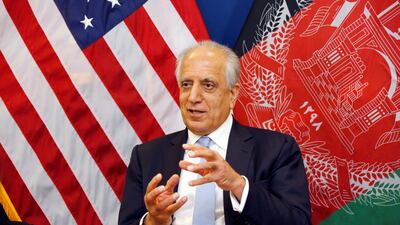US envoy for peace in Afghanistan Zalmay Khalilzad is travelling to the region this week in a bid to break the stalemate in political talks.
The State Department announced on Monday that Mr Khalizad has left on a trip to Afghanistan, India, Pakistan, Qatar, Russia, and the United Kingdom that will go until May 11, and “is part of the overall effort to facilitate a political settlement that ends the conflict in Afghanistan.”
In the first stop, Kabul, Mr Khalilzad “will consult with the Afghan government and other Afghans to encourage all parties to work towards intra-Afghan dialogue and negotiations to determine a final peace settlement.”
Afghan and Taliban officials were supposed to meet in Doha this weekend for what was dubbed the intra-Afghan dialogue, but the summit has been postponed indefinitely after a row about the number of delegates Kabul planned to send. President Ashraf Ghani’s administration announced on Monday that 250 afghans from all walks of life would represent the government. The Taliban replied that the meeting was not “an invitation to some wedding or other party at a hotel in Kabul.”
The comments let to more recriminations between the sides, each blaming each other – and Kabul blaming the host nation of Qatar – for the derailment. Although the Taliban said the meeting didn’t represent an official Taliban-Government summit, it would have been a big step as the militant group has refused for years to meet officials who they call a puppet regime of the US.
In Afghanistan, Mr Khalizad faces a tough test as government officials have expressed concerns over the direct US-Taliban peace talks that have mainly focused on a pull out of American troops and how the Taliban can ensure it will stop militant groups using Afghanistan as a base to plan and carry out attacks against the United States.
These concerns recently boiled over when President Ashraf Ghani's National Security Advisor, Hamdullah Mohib, launched a blistering public attack on Mr Khalizad while visiting Washington, saying the US official was seeking personal benefit by side-lining the government. After the comments, the US administration reportedly told Mr Ghani that they would no longer speak with Mr Mohib.
While other senior officials have downplayed the rift, it indicates that some in the Afghan administration have concerns.
“In London, Moscow, Islamabad, and New Delhi, he will work to build international support for the Afghan peace process to help ensure that any peace settlement reached will be sustainable,” the statement said. “In Doha, he will continue to press forward on negotiations with the Taliban to reach a consensus on core national security issues, and urge their participation in an inclusive intra-Afghan dialogue,” it added. The Taliban have a political office and negotiating team based in Doha.
The trip comes after Mr Khalilzad expressed dismay ten days ago over the Taliban's latest announcement of a Spring offensive.
The US envoy then called the announcement “reckless” and described it as “irresponsible to suggest that an increase in violence is warranted because the government announced a security plan.”
The announcement could derail peace talks with the Taliban as it “demonstrates their indifference to the demands of Afghans across the country.”
“The call for more fighting will not advance peace efforts. If executed, it will only yield more suffering and thousands more causalities,” the US envoy said.
He added that some members of the group “including fighters and some leaders oppose this announcement.” After condemning the announcement, Mr Khalilzad called on “Pakistan, Qatar, and other nations that want peace in Afghanistan to do the same.”
The US envoy held direct talks with the Taliban last March in Doha that lasted 13 days. The US is hoping to seal a draft agreement on counter-terrorism assurances, troop withdrawal, intra-Afghan dialogue, and a comprehensive ceasefire before Afghan voters go to the polls in July.

